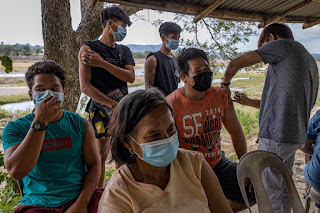By David Adam
...And although the WHO and others (click here) have suggested that huge numbers of Omicron infections could signal the end of the pandemic, because of the short-term surge in immunity that will follow, researchers warn that the situation remains volatile and difficult to model.
“It moves so fast that it gives very little time to prepare any kind of response. So, decisions have to be made under huge uncertainty,” says Graham Medley, an infectious-diseases modeller at the London School of Hygiene & Tropical Medicine, who advises the UK government....
...That places policymakers and the researchers who advise them in an unenviable position. “It was a situation where you either put in restrictions very, very early, or you do nothing,” Pagel says. “But if you wait to see what happens, then it’s too late.”
Along with other countries, Britain tightened regulations in December. But it was a controversial move, particularly because reports from South Africa, which was hit by Omicron the previous month, suggested that the variant seemed to cause less severe illness and hospitalization — a conclusion now supported by the experience of the United Kingdom and other places....
